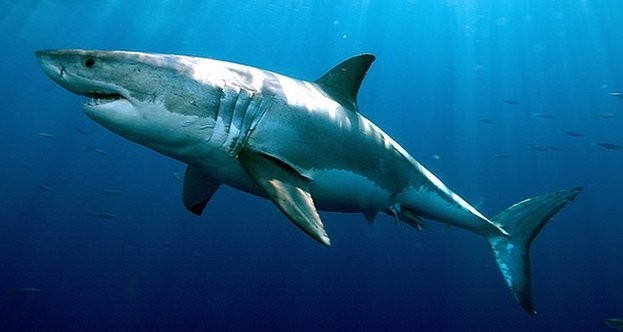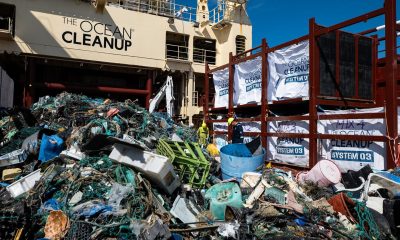Marine Life & Conservation
Great white sharks can ‘live for 70 years’, new study claims

Great white sharks live far longer than was previously thought.
Using a new technique to age the tissues of these impressive creatures, scientists have identified a male great white that lived into its 70s.
The researchers say the finding has important implications for the animals’ protection.
Knowing the longevity of a species, how fast it grows and when it reaches sexual maturity is vital information for designing conservation programmes.
“These creatures are amazing and it’s fascinating to study them,” said Li Ling Hamady, who is part of a joint programme between MIT and the Woods Hole Oceanographic Institution in the US.
“Everyone thinks they know these animals so well, and the public perception is that they’re either loved or hated. But in terms of the science, we’re only just now beginning to understand what they eat, where they go and how long they live.”
Scientists have tried to age the spectacular predators by counting annual growth rings in their tissues, such as in their vertebrae. But the sharks’ cartilage skeleton makes the division between these rings hard to discern even under the microscope.
Now, Ms Hamady and colleagues have said that they made these rings easier to read by looking for a known radioactive marker.
This is a type, or isotope, of carbon atom that was produced in the fallout from the atmospheric nuclear bomb tests in the 1950s and 1960s.
It would have gone into the ocean and been incorporated into the tissues of marine animals living through that period. The scientists used the easy-to-detect radioactive carbon as a kind of date stamp to help them count and calibrate the growth layers better and thus determine the age of their test samples.
“I always think the vertebrae are remarkably small for such a big animal,” explained Ms Hamady.
“Also, as they get older and larger, the sharks either stop laying down material or the layers become so thin they’re really difficult to see. It’s very fine work. I’m using a microscope and a razor and even then it’s hard to get annual resolution.”
Previous studies on Indian and Pacific Ocean animals – not using the A-bomb marker approach – had suggested great whites were certainly capable of living into their twenties. With the bomb markers, age estimates for the MIT-WHOI animals were up to 73 years old for the largest male in the study, and 40 years old for the largest female.
All these animals came from the Atlantic, but the researchers do not think there are any significant differences between the lifespans of the sharks living in the three big ocean basins.
Assuming they do live into the 70s in a normal lifetime, white sharks may now be considered among the longest-lived of all cartilaginous fish.
These icons of the sea have suffered some bad press down the years, very often unfairly, and like many of the world’s sharks have come under increased hunting pressure.
According to the IUCN list of threatened species, great whites are considered “vulnerable”.
But if, as now seems likely, they are slower growing and later to mature than was previously recognised, it means also that great whites would find it harder to recover their numbers if populations are depressed because of fishing, environmental and other pressures.
Ian Fergusson, a founding patron of the Shark Trust, commented: “White sharks have a fairly low fecundity in terms of litter size. Typically, females might have a handful of pups per litter, and we’re not sure how often they even get pregnant in a lifetime.
“It puts a spotlight on the need for the conservation of white sharks to be considered on a par with the conservation we have – and take for granted – for marine mammals, which also have low fecundity, long lifespans and late maturity. The conservation of sharks is not like the conservation of trout in a river, and that’s something people in the fisheries business don’t always understand.”
Source: www.bbc.co.uk/news
Photo: Greg Skomal / MA Marine Fisheries
Blogs
The Ocean Cleanup Breaks 10,000,000 KG Barrier

The Ocean Cleanup, the global non-profit project, has removed a verified all-time total of ten million kilograms (22 million lbs.) of trash from oceans and rivers around the world – approximately the same weight as the Eiffel Tower.
To complete its mission of ridding the oceans of plastic, The Ocean Cleanup uses a dual strategy: cleaning up the Great Pacific Garbage Patch (GPGP) to remove the plastic already afloat in the oceans, while stopping the flow of plastic from the world’s most polluting rivers.
Through cleaning operations in the GPGP and in rivers in eight countries, the cumulative total of trash removed has now surpassed ten million kilograms. This milestone demonstrates the acceleration of The Ocean Cleanup’s impact, while underlining the astonishing scale of the plastic pollution problem and the need for continued support and action.
While encouraging for the mission, this milestone is only a staging point: millions more tons of plastic still pollute our oceans and The Ocean Cleanup intends to continue learning, improving and innovating to solve this global catastrophe.
This announcement comes as governments from around the world meet to continue negotiations to develop a new legally binding instrument to end plastic pollution at INC4 in Ottawa, Canada. Representatives of The Ocean Cleanup will be in attendance and the organization will be urging decision-makers to collaborate towards a comprehensive and ambitious global treaty which addresses plastic at all stages of its life cycle and in all marine environments worldwide, including in areas beyond national jurisdiction.
It is encouraging to see that the need for remediation is reflected in the various options for potential treaty provisions. It is essential that the final treaty contains clear targets for the remediation of legacy plastic pollution, and reduction of riverine plastic emissions.
Tackling plastic pollution requires innovative and impactful solutions. The treaty should therefore incentivize the innovation ecosystem by fostering innovations that make maximal use of data, technology and scientific knowledge – such as those designed and deployed by The Ocean Cleanup.
‘After many tough years of trial and error, it’s amazing to see our work is starting to pay off – and I am proud of the team who has brought us to this point.’ said Boyan Slat, Founder and CEO of The Ocean Cleanup. ‘While we still have a long way to go, our recent successes fill us with renewed confidence that the oceans can be cleaned.’
The Ocean Cleanup was founded in 2013 and captured its first plastic in 2019, with the first confirmed catch in the GPGP coming soon after the deployment of Interceptor 001 in Jakarta, Indonesia. After surpassing one million kilograms of trash removed in early 2022, the non-profit project has since progressed to the third iteration of its GPGP cleaning solution, known as System 03, and a network of Interceptors currently covering rivers in eight countries, with more deployments set for 2024.
About The Ocean Cleanup
The Ocean Cleanup is an international non-profit organization that develops and scales technologies to rid the world’s oceans of plastic. They aim to achieve this goal through a dual strategy: stemming the inflow via rivers and cleaning up the legacy plastic that has already accumulated in the ocean. For the latter, The Ocean Cleanup develops large-scale systems to efficiently concentrate the plastic for periodic removal. This plastic is tracked and traced through DNV’s chain of custody model to certify claims of origin when recycling it into new products. To curb the tide via rivers, The Ocean Cleanup has developed Interceptor™ solutions to halt and extract riverine plastic before it reaches the ocean. Founded in 2013 by Boyan Slat, The Ocean Cleanup now employs a broadly multi-disciplined team of approximately 140. The foundation is headquartered in Rotterdam, the Netherlands.
For more information, visit: theoceancleanup.com and follow @theoceancleanup on social media.
Marine Life & Conservation
Steve Backshall to headline Shark Trust’s flagship event: For the Love of Sharks

Join a host of amazing, shark loving, speakers including Steve Backshall and the Shark Trust team for an evening celebrating shark conservation at the Royal Geographical Society in London this November.
Date: 29th November 2024
Time: 6-10pm
Location: Royal Geographical Society, London
Tickets: https://www.sharktrust.org/Event/flos24
The event will be a celebration of all things shark. Those lucky enough to get hold of tickets will hear from engaging guest speakers with a passion for sharks.
The line-up includes (*subject to change if unforeseen circumstances arise)
Steve Backshall: One of television’s busiest presenters, BAFTA award-winning wildlife expert Steve has been passionate about the wild world ever since he was young.
Steve’s impressive TV career has taken him all around the world, investigating a wide array of species and environments. Steve has filmed over 100 hours of children’s wildlife programmes with the BAFTA award winning Deadly 60 franchise and recently, with Sky Nature, for his new series ‘Whale with Steve Backshall’. He has been a patron for the Shark Trust for 10 years.
Simon Rogerson: is a photojournalist specialising in natural history, diving and the sea.
He is editor of SCUBA magazine, the official journal of the British Sub-Aqua Club. Simon started his career as a crime reporter but gravitated towards his ‘less depressing’ interest in underwater exploration, joining the staff of DIVE magazine in 1999. In 2005 he was named ‘Editor of the Year’ in the PPA’s Independent Publishing Awards. Simon also works as a freelance writer, contributing frequently to the Sunday Times and Telegraph, in addition to BBC Wildlife, Esquire, and a host of international diving magazines. He is the author of a book, Dive Red Sea, published by Ultimate Sports. Now based in Berkshire, Simon has been a Patron of the Shark Trust for 20 years.
More speakers to be announced soon. Head to the Shark Trust website to learn more.
The evening will also allow guests the final chance to see the Oceanic 31, shark art exhibition. Some of the artwork will be auctioned/raffled at the event, while the rest will be auctioned online to raise money for the Shark Trust Oceanic Programme.
For the Love of Sharks is an evening with something for everyone who is interested and fascinated by sharks. Join the Shark Trust, their Patrons, Trustees and Staff, along with a host of supporters for this celebration of shark conservation.
For more information or to buy a ticket: https://www.sharktrust.org/Event/flos24
-

 News3 months ago
News3 months agoCapturing Critters in Lembeh Underwater Photography Workshop 2024: Event Roundup
-

 Marine Life & Conservation Blogs3 months ago
Marine Life & Conservation Blogs3 months agoCreature Feature: Swell Sharks
-

 Blogs2 months ago
Blogs2 months agoMurex Resorts: Passport to Paradise!
-

 Blogs2 months ago
Blogs2 months agoDiver Discovering Whale Skeletons Beneath Ice Judged World’s Best Underwater Photograph
-

 Gear Reviews3 weeks ago
Gear Reviews3 weeks agoGEAR REVIEW – Revolutionising Diving Comfort: The Sharkskin T2 Chillproof Suit
-

 Gear Reviews3 months ago
Gear Reviews3 months agoGear Review: Oceanic+ Dive Housing for iPhone
-

 News2 months ago
News2 months agoPADI Teams Up with Wellness Brand Neuro to Drive Ocean Change and Create a Blue State of Mind
-

 Marine Life & Conservation2 months ago
Marine Life & Conservation2 months agoSave the Manatee Club launches brand new webcams at Silver Springs State Park, Florida

















